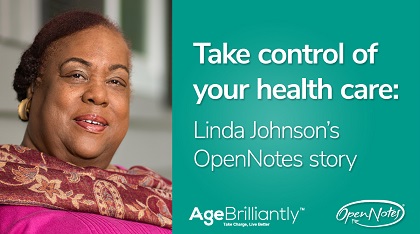
by OpenNotes – posted first by Age Brilliantly on August 29th, 2017
“I’m a baby boomer, and my son’s on the other end of the baby boomers. We come from a place where doctors tell you what to do. Patients don’t ask the doctor anything, you know. He tells you and you go for it, and so, you’re sitting idle,” says Linda Johnson, who lives in Seattle and receives her care at Harborview Medical Center. “The generation after us – they ask more questions, they want to know more information.”
When OpenNotes co-founder Tom Delbanco first started practicing medicine, all medical records were on paper and were only shared with other doctors as needed. The records were certainly not shared with you (the patient). And why would they be? Linda Johnson is right: doctors told patients what to do, and by and large, that’s what patients did.
Ms. Johnson is also right in recognizing that times have changed. In 1996, the Health Insurance Portability and Accountability Act (HIPAA) was passed, giving patients the right to receive and review the contents of their medical records. But HIPAA didn’t make it easy for patients to get them. As anyone who has done it can attest, requesting medical records can be tedious. It takes time, effort, and often money to get copies of records that too often arrive long after you need them.
Fast forward 20 years and technology is now pushing health care firmly into the digital age. The vast majority of hospitals now use an electronic health record (EHR) and more health systems have created secure patient portals that grant consumers access to vital health information, including visit notes, online, whenever you want or need to access it.
Access To Your Medical Notes
Did you know that your doctor writes a note after every visit? Visit notes summarize the conversation you had with your doctor, providing details about things like prescription updates, follow up appointments that need to be made, and the agreed upon care plan. It’s all in there!
Studies have shown that you remember at most 70 percent of what was discussed during a visit, but when notes are available on the patient portal, you can revisit the conversation to remember what you talked about with your doctors, help them manage care between visits, and prepare for future visits. You can also share information with care partners if you choose.
That turned out to be a life saver for Ms. Johnson when she experienced a health emergency while visiting her daughter in Baltimore. She was able to provide real time access to the contents of her medical record, and her daughter was then able to share vital information with the doctors in Baltimore, ensuring that her mom got the best and most immediate care.
“They were able to have a conversation, and my daughter could talk on my behalf,” recalls Ms. Johnson.
Back in Seattle and healthy, Ms. Johnson is still managing her own health care. She says having online access to her health records, including the notes, helps her feel more in control of her health and health care.
“By reading my notes, I have enough information to know that if there is anything that is needed, if I need to get my prescriptions updated, I can ask my doctor about it,” she says. “And then because I am aware of what things we are looking for, I can have a good conversation with her about how my body is feeling and the preventative kind of things I should be doing. You know. I do a lot of stuff to just try to keep myself to be able to move in the morning.”
But, as Ms. Johnson ages, she expects her children will become more involved. She has granted both of her children access to her medical records. She wants to them to be able to easily get to her health information and read what her doctors say so that if they need to, her children can make informed decisions on her behalf.
More than 17 million Americans at dozens of health systems across the country have full access to their medical records, including their visit notes. Do you? If not, ask! Download a sample letter provided by OpenNotes asking your doctor to share his/her notes with you! Take control of your health care.
What are some other tools you use to share medical information with your family? How have you benefited from having access to your medical notes? Does it make your life easier or does it feel like a chore? Share your experience on the Age Brilliantly community forum!
Written by: OpenNotes. OpenNotes is a national movement dedicated to making health care more open and transparent by encouraging doctors, nurses, therapists, and others to share their visit notes with patients through a secure, patient portal, giving patients easier access to important medical information they already have the legal right to receive. The goal is to empower patients, families, and caregivers to feel more in control of their health care decisions, and to improve the quality and safety of care. Learn more at www.opennotes.org.



